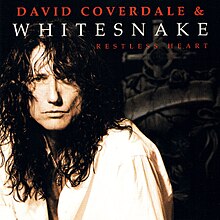
Back Restless Heart Czech Restless Heart German Restless Heart Spanish Restless Heart Finnish Restless Heart French Restless Heart (Whitesnake) Croatian Restless Heart (Whitesnake) Italian レストレス・ハート (ホワイトスネイクのアルバム) Japanese Restless Heart Korean Restless heart Dutch
| Restless Heart | ||||
|---|---|---|---|---|
 | ||||
| Studio album by | ||||
| Released | 26 March 1997 | |||
| Studio | Sierra Sonic, Reno, Nevada | |||
| Genre | Hard rock, blues rock | |||
| Length | 55:51 | |||
| Label | EMI | |||
| Producer | David Coverdale | |||
| David Coverdale chronology | ||||
| ||||
| Whitesnake chronology | ||||
| ||||
| Alternative cover | ||||
 Japanese cover art | ||||
| Alternative cover | ||||
 Reissued cover art | ||||
| Singles from Restless Heart | ||||
Restless Heart is the ninth studio album by English hard rock band Whitesnake, released by EMI on 26 March 1997 in Japan and 26 May in Europe. It was produced by the band's vocalist David Coverdale and originally conceived as a solo album. However, EMI pressured him into releasing the record under the moniker "David Coverdale & Whitesnake". Musically Restless Heart features a more subdued sound compared to Whitesnake's previous two albums. It is also the only full-length Whitesnake studio album to feature guitarist Adrian Vandenberg throughout, despite having been a member of the group since 1987.
The album received a mixed response from music critics, and only reached number 34 in the group's native UK. In total, Restless Heart charted in ten countries. With Whitesnake having been dropped by Geffen Records in 1994, Restless Heart did not receive a North American release, being available only as an import. The album's supporting tour was billed as Whitesnake's farewell tour, although the band would later reform in 2003. Restless Heart was reissued by Rhino Entertainment in 2021, featuring remastered and remixed versions of the album, among other previously unreleased material.
- ^ "Get close to rock legend Dave". Liverpool Echo. Liverpool, England. 2 May 1997. p. 38. Retrieved 26 November 2023 – via Newspapers.com.
- ^ "David Coverdale & Whitesnake New Single – 'Don't Fade Away'" (Press release). London, England: EMI UK. 24 September 1997. Archived from the original on 28 November 2023. Retrieved 29 November 2023.